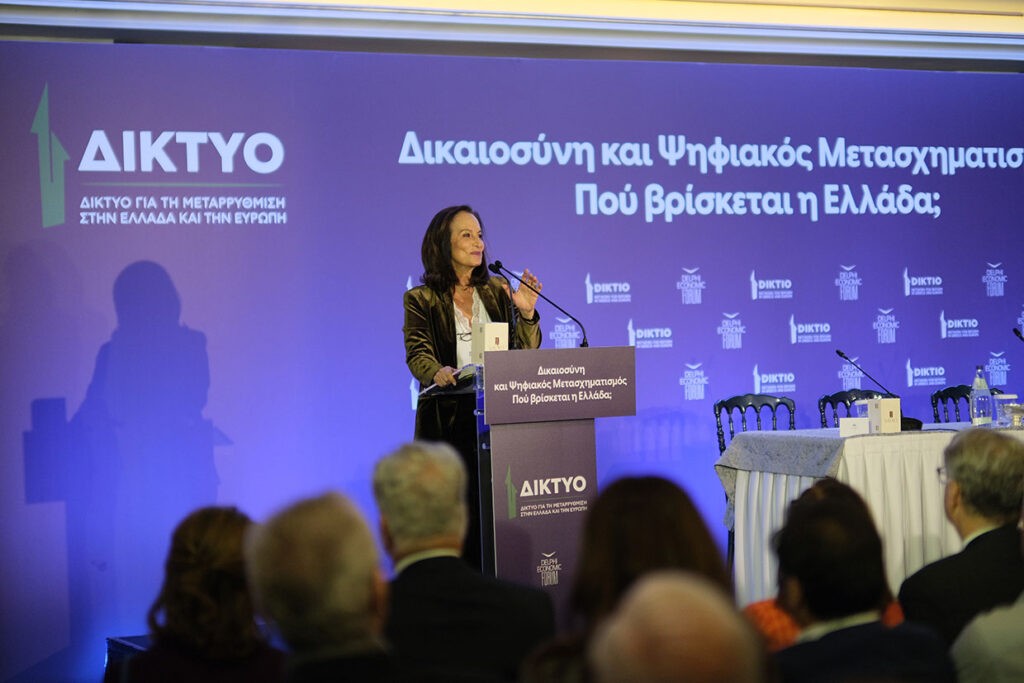Athens, February 13, 2024 – The role of the people who compose the judicial sector (judges, lawyers, and judicial officials) emerged as the most critical factor for advancing digital transformation, during the event titled “Justice and Digital Transformation – Where is Greece?” organized by DIKTIO – Network for Reform in Greece & Europe with the support of the Delphi Economic Forum. The event was attended by 300 people in person and watched by over 1000 people online.
Justice Minister Giorgos Floridis spoke about the digital transition of justice, highlighting the need for judges and courts to adapt to new modern technological realities through emblematic projects already underway. He also emphasized that the human factor of all justice sector participants plays a significant role in this endeavor. The Ministry, judges, lawyers, and judicial officials must coordinate their actions so that the technological capabilities, emerging from and supported by the RRF, can be promoted and developed at a faster pace.
The Minister of Digital Governance, Dimitris Papastergiou, stressed the importance of digitizing the justice sector to improve the speed of justice delivery, which contributes decisively to the smooth operation of the state, strengthens citizens’ trust, and enhances the country’s growth dynamics. He highlighted the significant momentum for this reform, given the resources provided by the RRF and the available expertise. Special mention was made of the new possibilities offered by the utilization of Artificial Intelligence applications, especially in accelerating processes.
Anna Diamantopoulou discussed the four pillars of reform in the justice sector: institutional, technological – AI, empowerment of human resources, and infrastructure. The President of DIKTIO noted that even where legislation for digital changes exists, it is not implemented, which is to the detriment of citizens, the economy, and the country. She estimated that these reforms pose a significant challenge for both ministries and proposed the creation and operation of an observatory (as DIKTIO had done in the past) to monitor the implementation of new digital tools in the judicial sector.
From his side, the Appellate Judge, President of the Three-Member Management Board of the Administrative Court of First Instance of Piraeus, Dimos Chrysos, described a judge’s daily experience and hurdles.
The second panel of the Seminar was about “Greece Today” and was moderated by the legal advisor – member of DIKTIO, Andreas Papakonstantinou.
Professor of Economics and former Minister of Development, Eleni Louri, referred to the importance of an effective judicial system for creating an attractive business environment, noting that 9 out of 10 multinational companies evaluate a country’s judicial system when deciding where to invest.
Michalis Pikramenos, Vice President of the Council of State, spoke about the digital transformation of justice, stating that the regulatory framework and the provision of material-technical infrastructure by the state are not enough; the application of the rule of law and the utilization of infrastructures by the human resources, i.e., judges, judicial officials, and lawyers, are also required.
Maria Simitzi-Vetoula, Judge at the Supreme Civil and Criminal Court of Greece & President of OSDDY, highlighted the need to incorporate Informatics into the courses taught at the National School of the Judiciary, while the Managing Director of the Information Society, Stavros Asthenidis, referred to the progress of projects implemented by the company for the digital transformation of justice (E Justice).
George Trapalis presented an online survey according to which public dissatisfaction with the speed of justice delivery reaches 97%, while over 70% of legal professionals support the use of signatures and documents in digital form.
The attention needed in implementing reforms in the justice sector was emphasized by MP and justice sector head of PASOK – KINAL, Milena Apostolaki, as the digitization of law requires special rules.
The President of the Athens Bar Association, Dimitris Vervesos, submitted data concerning the operation of courts and bar associations and called for the full operation of an electronic document circulation system, where everyone will have access, will sign, and circulate material electronically.
The event was honored by the presence of the President of the Supreme Civil and Criminal Court, Ioanna Klappa-Christodoulea, the Prosecutor of the Supreme Civil and Criminal Court Court, Georgia Adeilini, the President of the Council of State, Evangelia Nika, the President of the Hellenic Court of Audit, Sotiria Ntouni, the President of the Personal Data Protection Authority (APDPA) Kostas Menoudakos, the Advocate-General of the Court of Justice of the European Union, Athanasios Rantos, and the former Minister of Justice Stavros Kontonis.










